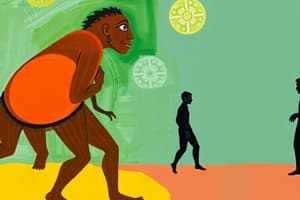Podcast
Questions and Answers
What is anthropology?
What is anthropology?
The scientific study of humanity, including human behavior, biology, cultures, societies, and linguistics.
Which theory emphasizes understanding cultures based on their own values?
Which theory emphasizes understanding cultures based on their own values?
The functionalist perspective is a form of micro-sociology.
The functionalist perspective is a form of micro-sociology.
False (B)
Who is considered the 'Father of American Anthropology'?
Who is considered the 'Father of American Anthropology'?
Signup and view all the answers
What does the conflict perspective in sociology examine?
What does the conflict perspective in sociology examine?
Signup and view all the answers
The study of cultures and their evolution is a focus of ______ anthropology.
The study of cultures and their evolution is a focus of ______ anthropology.
Signup and view all the answers
Which proponent of anthropology focused on the study of small-scale societies?
Which proponent of anthropology focused on the study of small-scale societies?
Signup and view all the answers
What does the interactionist perspective focus on?
What does the interactionist perspective focus on?
Signup and view all the answers
Study Notes
Social Science Disciplines
- Key branches include Anthropology, Psychology, Sociology, Economics, Political Science, and History.
Anthropology
- Defined as the scientific study of humanity, covering human behavior, biology, cultures, societies, and linguistics across time.
- Theoretical frameworks include:
- Evolutionary Theory: Based on Darwin’s work, it explains human development through natural selection.
- Cultural Relativism: Introduced by Franz Boas, emphasizes evaluating cultures based on their own values.
- Structuralism: Developed by Claude Lévi-Strauss, focuses on underlying structures in cultural meanings.
- Symbolic Interactionism: Draws from George Herbert Mead; emphasizes the role of symbols and language in human interaction.
- Postmodernism: Challenges the existence of objective knowledge and universal truths in anthropology.
- Political Economy: Analyzes the impact of economic and political factors on cultural and social structures.
- Feminist Anthropology: Critiques traditional methods from a gender perspective, highlighting women's and marginalized groups' experiences.
- Postcolonial Theory: Explores the aftermath of colonialism, focusing on issues of power and identity.
- Practice Theory: Associated with Pierre Bourdieu, it looks at how social practices are shaped by individual agency and social structures.
Modern Age Proponents of Anthropology
- Charles Darwin: Established theories of evolution, foundational to biological anthropology.
- Lewis Henry Morgan: Pioneered scientific anthropology and social evolution theories.
- Sir Edward Burnett Tylor: Focused on cultural anthropology and the evolution of culture, particularly animism.
20th Century Proponents of Anthropology
- Franz Uri Boas: Known as the "Father of American Anthropology," advanced historical particularism and cultural relativism.
- Margaret Mead: Pioneered cultural anthropology, particularly in ethnographic studies on childhood, adolescence, and gender.
Significance of Anthropology
- Enhances understanding of human diversity and evolution.
- Plays a crucial role in preserving cultures and applying anthropological knowledge for societal benefit.
Sociology
- Sociology examines social order, change, and developmental processes through core perspectives:
- Interactionist Perspective: Micro-sociology focusing on individual behavior influenced by societal meanings.
- Functionalist Perspective: Macro-sociology emphasizing interconnected relationships and cooperation within societal systems.
- Conflict Perspective: Views society as composed of competing groups with differing interests.
Studying That Suits You
Use AI to generate personalized quizzes and flashcards to suit your learning preferences.
Related Documents
Description
Explore the various fields of social science, including anthropology, psychology, sociology, and more. This quiz will test your knowledge of the key concepts and historical background of each discipline. Understand how these fields contribute to our understanding of human behavior and cultures.



